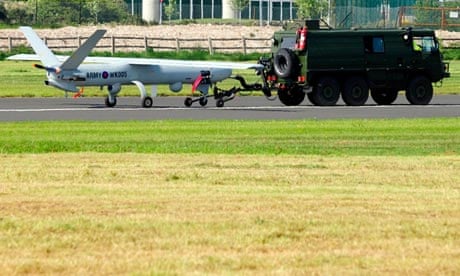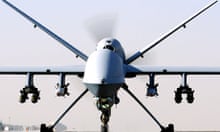The British military now has 500 drones and has been looking for ways to increase the amount of UK airspace in which to fly some of them, the Guardian can reveal.
The expansion of the fleet of unmanned aerial vehicles (UAVs) is in line with the Ministry of Defence's ambition for a third of the Royal Air Force to consist of remotely piloted aircraft by 2030. But the disclosure will dismay campaigners who have raised ethical and legal concerns over UAVs, which have been used extensively in Afghanistan, and by the CIA to target Taliban and al-Qaida leaders across the border in Pakistan.
There is currently only one British base where UAVs and normal aircraft can fly together in the same airspace – the privately owned West Wales Airport (WWA) in Aberporth. The MoD has been using the airfield to test the new Watchkeeper surveillance drone and is working with the Department for Transport and the Civil Aviation Authority to "open up more airspace to remotely piloted systems", the ministry said.
The military runs a number of UAV systems, from the Reaper, which can carry Hellfire missiles and laser-guided bombs, to the Black Hornet mini-helicopter, which can fit in the hand. Both have been used extensively in Afghanistan, as has the Hermes 450 surveillance drone which will be replaced by the new Watchkeeper; the army has bought 54 of the new aircraft, and the manufacturer Thales told the Guardian it had delivered 27 of them.
The MoD insists British UAVs operate within a robust framework and are subject to the same rules of engagement as fast jets and military surveillance planes.
The UK has five Reapers in Afghanistan, which have fired 350 missiles and laser-guided bombs. Five new Reapers will be in service in Afghanistan shortly, and some of the fleet's operations will be run from the RAF's new drones hub at Waddingon in Lincolnshire. Officials say the Reapers will become part of the military's core equipment and that more are likely to be bought in the future.
But the MoD insisted none of the 10 Reapers for Afghanistan would be brought back to the UK when British forces withdrew next year. "No decisions have been taken on the longer term use or basing of Reaper equipment," a spokesman said. "For avoidance of doubt, there are no current plans to operate Reaper aircraft in the UK." British Reapers in Afghanistan have clocked up more than 45,000 hours in the air, encouraging the MoD to increase the number of UAV systems over the next decade.
The spokesman said: "The expectation is that our future combat air capability will be based around a suitable mix of manned fast jets and remotely piloted air systems. Our recent operational experience with Reaper has demonstrated the importance of them to 21st-century air power.
"They provide a key capability in current operations and will continue to act as the basis for a persistent surveillance capability in future conflicts. If technology continues to develop as expected, it may be possible to move towards a mix of around one-third remotely piloted platforms to two-thirds manned platforms within the 2030 timeframe."
However, the MoD said it would not be buying or developing fully automated robotic systems – a major concern for campaigners. "There is no intent … to develop systems that operate without human input in the control and weapon command chains," the official said.
With UAVs integral to the future of military and civilian aviation, Elizabeth Quintana, a senior research fellow at the Royal United Services Institute thinktank, said the MoD had to be more open about the subject. "The MoD, and indeed the government, needs to better articulate why [UAVs] are an essential part of the future force mix and the measures already in place to assure ethical use of force," she said. "The debate so far has not been properly informed. The MoD should not be afraid to put forward its case."
Quintana said a recent poll for the thinktank appeared to show the British public was "more relaxed about the use of UAVs than you might think".
"I think over here, if people are presented with a choice between killing a known terrorist, or letting him get away, people think you should go ahead."





Comments (…)
Sign in or create your Guardian account to join the discussion